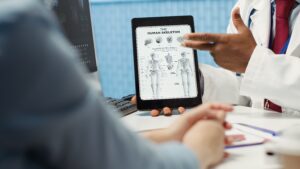Medical students enrolled in an M.D program get the opportunity to polish their clinical skills and work directly with physicians in different hospital settings. The first two years of medical school (preclinical years) focus on building the strong foundation of medicine and important biological concepts to build a deeper understanding of the field of medicine. While the final two years (clinical years) are solely focused on providing hands-on clinical experience and preparing medical students for stressful and high-pressure time.
The last two years of medical school journey are exciting, as future physicians experience life as a physician firsthand. If you are a third-year medical student, it’s the time to prepare for the next phase of medical education – clinical training. It is the most exciting yet challenging phase of medical school life, entirely different from preclinical work, packed with different roles and opportunities.
If you are all set to embark on your clinical rotations, here are some important things to consider before starting their medical school rotations.
Prepare in Advance
Clinical rotations allow students to apply the medical knowledge they have learned in preclinical years in real life hospital or clinical settings. Every clinical rotation is different from others, the key is to prepare in advance to refresh your concepts so that you can apply your knowledge in the real-world healthcare settings.
Medical students will move from traditional classroom settings into a real-world, functioning environment. Clinical rotations will check your medical concepts and help you learn how to deal with complicated medical cases and provide excellent patient care.
It gives you a great opportunity to work with physicians, paramedical staff, real patients, which will eventually build your clinical, professional, communication and interpersonal skills. You will get the opportunity to deal with complicated medical cases and retain information in clinical settings. It will help you prepare for the USMLE Step 2 CK which is the board exam you need to pass with flying colors to become a certified physician.
Refresh Your Concepts
To prepare for the clinical rotations, the key is to carefully research the types of rotations you are going to complete. Medical students get the opportunity to gain work experience in a variety of medical specialties, including internal medicine, family medicine, pediatrics, psychiatry, neurology, general surgery and obstetrics and gynecology. You need to refresh the medical concepts, mechanisms of action, medical terminologies, case studies, and diagnoses. By refreshing your memory, you will be better able to perform well during a clinical rotation. Remember, research is important to understand what concepts and knowledge you need to refresh in the core specialties before appearing in a rotation.
Believe in Yourself
Transitioning from the classroom to a real medical setting is a challenge. Applying the basic medical knowledge to real patients is an extremely difficult exercise. Unlike classroom lectures and lab work, medical school rotations are solely focused on providing care to real patients. You need to be ready for different challenging and difficult situations.
You can deal with day-to-day challenges if you believe in yourself and your abilities. Figure out your own strengths and limitations to make the most out of your medical training. If you face trouble dealing with any issue, ask questions to attending physicians and request residents to help with things you don’t know. Your supervisors will truly understand that you are in a transition phase (from classroom to the clinics) and will do their best effort to fill in the knowledge and skill gaps.
Learn Important Skills
Clinical rotations give medical students a great opportunity to work in hospital and clinical settings and perform a lot of responsibilities. For instance, they will work individually or in groups, take patients’ history, perform physical examinations, review lab reports and participate in team learning discussions.
They work in different medical fields such as pediatrics, surgery, internal medicine, family medicine, neurology and more. The purpose of these clinical rotations is to give students a well-rounded and holistic experience of becoming a doctor.
These rotations provide hands-on experience in every specialty and what kind of skills and experience you need to pursue a career in each one. After pursuing an MD degree, you will apply to residency programs and choose a specialty. Gaining experience in multiple medical specialties help students choose the right medical specialty and make the right career decision.
Be Active During Clinical Rotations
Performing well during clinical rotations will help you prepare for a competitive residency and a clear idea about the life of a resident. You can show your commitment to the medicine profession by managing your time effectively and actively engaged in all diagnostic procedures. Show up early, always ready to learn new things, ask for feedback, ask questions if you don’t fully understand how to perform a specific procedure.
Students who show willingness will make a good impression on attending physicians and supervisors. Performing actively during clinical rotations and building a strong relationship with your supervisors will help you collect strong letters of recommendation for your residency application. Keep in mind that letters of recommendation are the most important element for your residency application that can strengthen your chances of getting a competitive residency program.
Concluding Thoughts
All in clinical rotations is a great opportunity that allows medical students to apply theoretical knowledge to hypothetical cases. It is strongly advised to prepare early and plan ahead of time to perform well during clinical rotations. So, prepare for your clinical rotations as early as possible so that you can gain valuable insights into the reality of medical school rotations and learn the tips to become a great physician.







